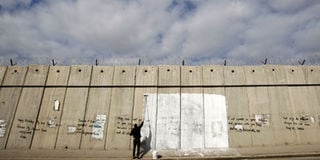Israel links truce to soldier's release

A Palestinian paints a section of the controversial Israeli barrier white in al-Ram in the West Bank on the outskirts of Jerusalem February 18, 2009. Photo/REUTERS
JERUSALEM, Wednesday
Israel decided on Wednesday against lifting a Gaza border blockade until Hamas agreed to release a captured Israeli soldier, effectively putting an Egyptian-proposed cease-fire on hold.
The Gaza Strip's Hamas rulers rejected linking a prisoner swap with Cairo's 18-month cease-fire plan that would include a reopening of the enclave's border crossings vital to reconstruction after Israel's 22-day offensive.
Outgoing Israeli Prime Minister Ehud Olmert convened his security cabinet, seeking support for a deal under which up to 1,400 Palestinian prisoners would be freed in exchange for the soldier, Gilad Shalit.
Mirroring Olmert's position, Interior Minister Meir Sheetrit, a member of the security cabinet, told Israel Radio that participants agreed unanimously that "it would be inconceivable" to enter a truce deal before Shalit's release.
Israel has allowed limited humanitarian supplies into the Gaza Strip but, keeping pressure on Hamas, has ruled out letting in building materials and other goods for the time being.
It was not immediately clear whether the security cabinet gave Olmert the green light to proceed with drawing up a list of Palestinian prisoners who would go free as part of an exchange.
Shalit was seized by Palestinian militants in 2006. They tunnelled into Israel from the Gaza Strip and took him into the enclave, which Israeli troops and settlers quit a year earlier.
"We are at the moment of truth. If Gilad Shalit doesn't come home now, it could go on and on for ages. This is the moment of opportunity," a senior Israeli official said.
Hamas spokesman Fawzi Barhoum insisted the group would accept no linkage between freeing the soldier and a truce, which it had expected to be announced by Cairo on Sunday.
"There is no connection between the matter of Shalit and (achieving) calm," Barhoum said, adding Hamas "had no objection" to the soldier's release if Israel met the Islamist group's demands on the Palestinian prisoners.
"This is Israeli intransigence and a Zionist delay -- a continued laying of obstacles in front of the Egyptian efforts," Barhoum said after the security cabinet decision.
Tough decisions
Sheetrit said before the session that getting Shalit back would mean the release of hundreds of prisoners. Diplomats said the deal would likely free close to 1,000 of the approximately 11,000 Palestinians held in Israeli jails.
An Israeli official said even if Israel and Hamas agree on a list of prisoners, they remain on odds over where they would be sent after the swap takes place.
"We want them expelled out the country but Hamas wants them to return to their homes," either in the Gaza Strip or the occupied West Bank, the official said, referring to prisoners Israel regards as the biggest security risks.
The issue is highly emotive for both sides. Palestinians view prisoners held by Israel as heroes of what they see as a battle against occupation.
Israel has carried out lopsided exchanges in the past, trading large numbers of Arab prisoners for its captured troops or their bodies.
Olmert said on Tuesday he hoped to win Shalit's freedom before he left office but a new Israeli government that will be formed following last week's national election might have to tackle the task.
Before the security cabinet met, Israeli aircraft bombed seven smuggling tunnels running under the Gaza-Egypt border, and a security compound in the Palestinian territory, a military spokesman said. No casualties were reported.
The attack was launched after mortar bombs were fired into Israel from the Gaza Strip on Tuesday. No one was reported hurt. (Reuters)




